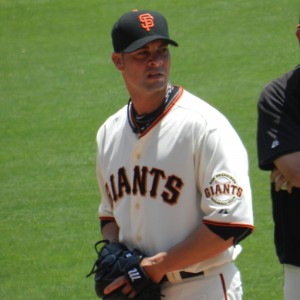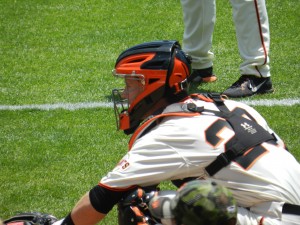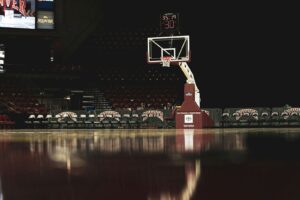
The pattern of the Giants’ success probably comes from the type of baseball they are accustomed to play. Even while filling the trophy case that former Oakland A’s and current New York Mets general manager Sandy Alderson said was unnecessary when AT&T Park was built, the Giants have never been a dominant team during the regular season. Their pitching has usually ranked near the top of the National League, but their lineups, even with stars like Buster Posey, have usually been only good enough not to waste their talent on the mound. Consequently, the tight, low-scoring games that are typical of October baseball—mostly a product of better pitching—are a way of life for the Giants in a way that few other major-league teams experience during seasons when they win. The slim margin of error that is a constant for the Giants bodes ill for the regular season, where consistent dominance is a better predictor of success, but it is a fine preparation to play games where every run counts and every mistake is magnified. Even the larger and louder crowds for playoff games, which can be unnerving for teams used to playing before quiet expanses of empty seats during the regular season, are no concern for the Giants. With forty-two thousand fans packing AT&T Park even on weeknight games in April, the October crowds are just another day at the office.
The strain of this kind of baseball has been most evident for the Giants in the years following their championships. In both 2011 and 2013, the Giants started their seasons well but collapsed into prolonged losing streaks. Their particularly early exit from contention in 2013 revived a phrase that had once been a common expression among Giants fans: the June Swoon. Injuries played a large role in both of these years, but there was also a lack of urgency to their play that manager Bruce Bochy openly acknowledged in 2013 in one of his rare public rebukes to his players. It may be that the Giants, more than other championship teams of the past, have needed to play at the peak of their abilities to win consistently. With short off-seasons allowing insufficient time to recover emotionally and physically from an additional month of high-stress baseball, they haven’t been healthy enough, inside and out, for the grind of another 162 games.

Later events showed what I knew. With the exception of a couple of hiccups, one of which they naturally saved for when I was in the house, the Giants made October look easy again. While I did not anticipate Travis Ishikawa’s dramatic home run that ended the proceedings, I felt relaxed in that ninth inning in the knowledge that the Giants would find a way to finish off the St. Louis Cardinals for the pennant, especially when Cardinals pitcher Michael Wacha lost his ability to find the strike zone. Something good was going to happen, and when it did, it all seemed destined by the natural order, and I accepted it quietly.
While I think the Giants will make a better showing in the Series than the teams the Kansas City Royals have faced up to now, the Royals may be the toughest matchup of all of their American League opponents. They look a lot like the Giants, only younger and faster. They pitch well, especially their bullpen, and they excel at forcing their opponents into mistakes. Their speed on the bases is especially problematic for the Giants, whose pitchers have been mediocre at holding runners even during their championships. Perhaps most important of all, this is a team that somehow doesn’t know that that they should be scared. They play with the belief that failure is something that happens to the other guy. Thus far, they have been right. I sense that most baseball fans outside of San Francisco are probably hoping to see them win four more games and finish the job. Given the three decades in the wilderness that the Royals have endured, this is only right.
The only advice I would offer, both to the Royals and their fans, is to enjoy and absorb this moment as much as possible and with the spice of a little urgency. When young and exciting teams appear suddenly on the grand stage, it is tempting to think that their story is only beginning, and that there will be many more championships within reach. The history of baseball, however, suggests otherwise. I once read that Willie McCovey, who famously ended the 1962 World Series with a line drive to Bobby Richardson, felt only mild disappointment at the time. The Giants were a great team, he believed, and he would see several more World Series in his career. He was right on the first point—the Giants won more games than any other team in baseball in the 1960s—but not on the second. Despite playing for over twenty years and reaching the Hall of Fame, McCovey never got another chance to play for a ring. Sometimes, one shot is all you get.
I can’t wait for tomorrow. Enjoy the show.


